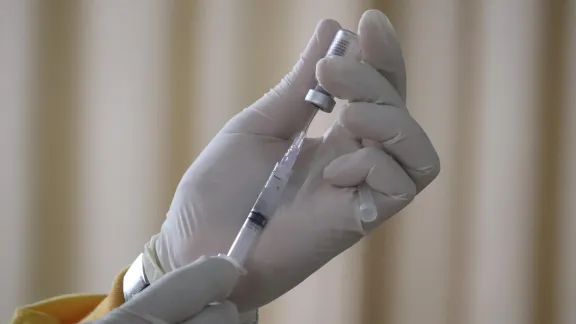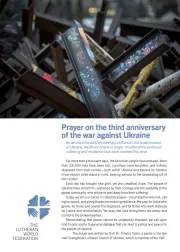LWF reiterates concern over vaccine inequity, and impact of pandemic on girls’ education

COVID-19 verstärkt Ungleichheiten, wie den Zugang zu Impfstoffen. Foto: Mufid Majnun, Unsplash
(LWI) – In spite of an expansive global response to the COVID-19 pandemic, “hundreds of millions of people” have not had access to life-saving vaccines, and two years on, it continues to exacerbate situations of vulnerability including poverty and gender-based violence.
A statement from The Lutheran World Federation (LWF) Council meeting in June strongly deplored “vaccine inequity which has resulted in too many people lacking vaccines,” and urged the international community to ensure swift and equitable access.
The LWF governing body noted it was “extremely distressed” about the pandemic’s impact on school girls whose right to education was disrupted after falling victim to teenage pregnancies and forced marriages during the lockdowns. The Council urged greater engagement by governments, church leaders and other stakeholders in protecting women and girls.
The Council also called on churches to do more to confront misleading theologies and disinformation about the pandemic.
LWF Council Statement on the COVID-19 pandemic
The Council notes with great concern that two years since the outbreak, COVID-19 remains a global pandemic, with hundreds of thousands of infections every day. The pandemic has caused an unprecedented number of deaths, dismantled the livelihoods of millions of people, and disrupted the daily lives of the entire global population. COVID-19 is not only a public health pandemic but has become a major amplifier of vulnerabilities, poverty, and gender-based violence, including intersectional issues.
The Council appreciates the various efforts to develop vaccines to respond to COVID-19. In spite of the expansive global response, hundreds of millions of people have been left out of life-saving vaccines and therapeutics. The Council strongly deplores vaccine inequity which has resulted in too many people lacking access to vaccines. The Council further decries the pervasive misinformation and disinformation about COVID-19 and vaccines, some of which is driven by harmful theological teachings and ideologies, that have contributed to slow acceptance of vaccines and other protective measures.
The Council is extremely distressed about the impact of COVID-19 on girls whose right to education has been disrupted due to teenage pregnancies, as well as early and forced marriages during lockdowns. This situation has been worsened by cultural biases, policies and laws that hinder them from returning to school.
The Council is grateful for the role that the LWF member churches have played in responding to COVID-19, particularly through the Rapid Response Fund, humanitarian and livelihood programs, advocacy as well as theological reflection.
The Council calls on:
- Governments and the international community to ensure swift and equitable distribution and access to COVID-19 vaccines and treatments, in accordance with existing international agreements.
- Governments, church leaders and other actors to increase their efforts towards protecting women and girls from gender-based violence in the context of the pandemic and to enable and support pregnant girls and teenage mothers who have been denied access to school, so they may return to school.
- LWF member churches to be supported to increase their efforts towards confronting misleading theologies, misinformation and disinformation in relation to the COVID-19 pandemic, and to promote theological perspectives of resilience, responsibility and hope, rooted in our Lutheran tradition.
The global community to learn from COVID-19 and to put in place robust measures to ensure preparedness, better response capacity and structures to safeguard everyone’s health and well-being in case of future pandemics.
The LWF Council is the highest authority of the LWF between Assemblies. It consists of the President, the Chairperson of the Finance Committee, and 48 members from LWF member churches in seven regions. The current governing body was elected at the May 2017 Twelfth Assembly in Windhoek, Namibia. The 2022 meeting takes place, 9-14 June, at the Ecumenical Center in Geneva.


